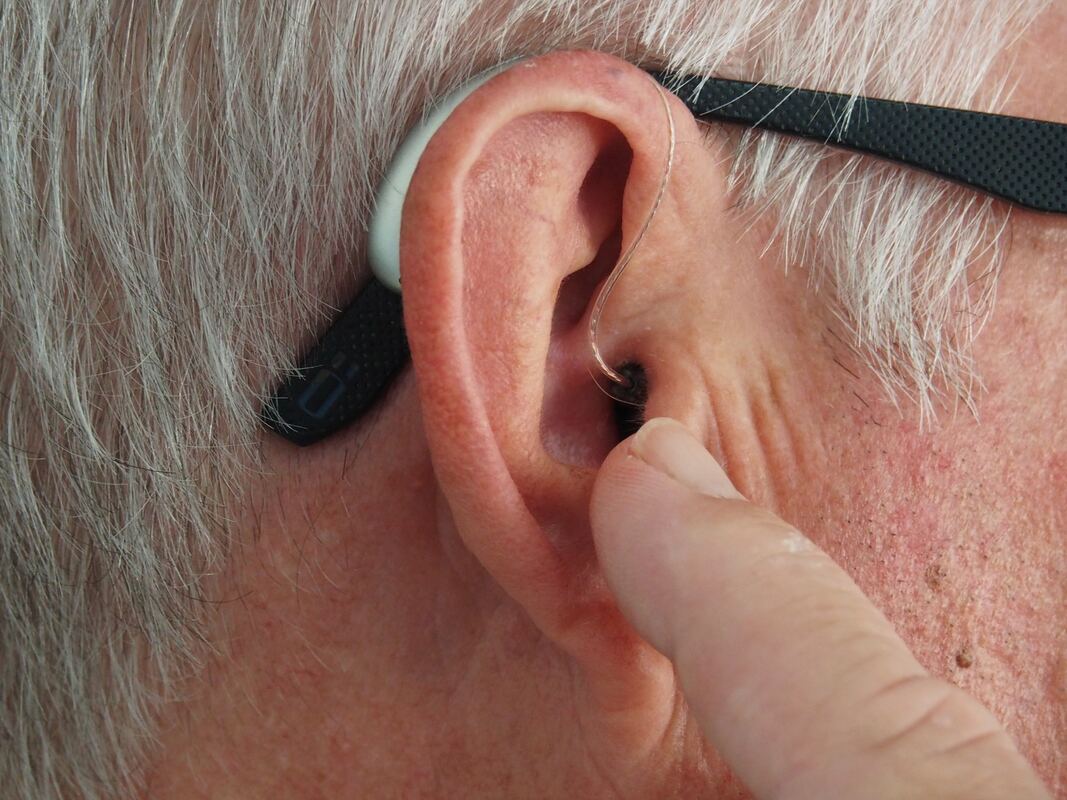|
It feels like summer started early this year. In addition to taking care of yourself during these summer months, you’ve got to take care of your hearing aids. All electronic devices, like hearing aids, can become damaged when exposed to too much heat, humidity, and moisture. Here are some ways to protect your hearing aids while ensuring the highest performance, even when sweating through the heat.
1. Keep your hearing aids stored in a cool, dry space. Your hearing aids’ wiring and how the devices perform; can be impacted negatively due to heat exposure. Any trapped moisture in the microphone or the receiver can make the hearing aid stop working. 2. Remove moisture from your hearing aids. Your hearing aids may need to remain stored in a dryer box, which is essentially a vacuum chamber that dries off your hearing aid devices. Talk to someone from Northumberland Hearing Center about a dehumidifier for your hearing aids. You may also use desiccant, or even dry, uncooked rice, can absorb moisture from your devices. If the damage is significant, your hearing aid provider may send your hearing aids to the original manufacturer for advanced repairs. 3. Protect your hearing aids from excess sweat. If your hearing aids tend to have built-up moisture caused by over-perspiration, take them out of your ears and open the battery door to let air circulate throughout the devices. Dry them off using one of the methods mentioned above. 4. Are you using sunscreen or insect repellent? These lotions and sprays can clog the microphones and receivers on your hearing aids. It’s best to put these ointments on before placing your hearing aids in your ears. The lotion and spray residue should be washed off of your hands thoroughly before handling your hearing aids to wear in your ears. Use professional-grade cleaning wipes on your hearing aids after you remove them from your ears. 5. Do not clean hearing aids with any liquids. You can damage hearing aids by cleaning them with liquids that contain alcohol. Only use a brush tool, soft cloth, or professional-grade cleaning wipes. If you need supplies to care for your hearing aids, Northumberland Hearing Center has you covered. We have offices located in Northumberland and Millersburg.
0 Comments
Whether you’ve experienced a terrible sinus infection or a head cold, you know that feeling when your ears and hearing start to change. Usually, your ears feel clogged, or there’s a severe feeling of pressure on them. Maybe you’ve even noticed that you couldn’t hear as well as usual. Seasonal allergies can impact you and change your hearing in the same manner. It can occur in the form of dust, mold, pet dander, or pollen by causing inflammation to your immune system which may result in congestion, itching, and sneezing.
Allergies can cause significant repercussions on your body, including respiratory problems and excess tears. Your hearing can also be affected, which can affect daily life and interactions. We’ll go over the impact of allergies on your ears and hearing. Does it cause tinnitus? What should you do if seasonal allergies have changed the way you hear? What is the Link between Hearing Loss and Allergies? Seasonal allergies are temporary. They sometimes change as the temperature and weather shift. People who suffer from allergies tend to become hypersensitive in the spring when the pollen count has peaked. Allergy sensitivities worsen when atmospheric pressure changes or humidity and moisture levels increase. A person’s age and the environment they are in also influence allergies and how they impact you. Your body creates histamines when you have an allergic reaction. You can experience inflammation in different areas, like the ears. Inflammation can cause ear pain, a sensation of pressure in the ears, and hearing loss. Can Allergies cause Tinnitus? Tinnitus is one of the most prevalent hearing problems linked to allergies. Tinnitus is a phantom noise, with no external source, that only the person suffering from it can hear. It may sound like a buzzing, chirping, or ringing noise. It typically occurs when the cochlea or sensory hairs have deteriorated or are obstructed. There are many possible causes of tinnitus, including allergies. 3 Instances Where Allergies Impact Your Hearing 1. Tinnitus After an allergic reaction, a fluid buildup may occur in your ear canals and behind your eardrums due to congestion and pressure on your sinuses. The pressure from this fluid can lead to sharp pain or feelings of clogged ears. When there’s a change in your sensitivity and the pressure to your sinuses, you might experience tinnitus allergies or worsen tinnitus symptoms. 2. Ear Infections An ear infection can occur if problems with your ears go unchecked and untreated during allergy season. When moisture gets trapped in your ears, it becomes the perfect environment for bacteria and viruses to thrive. In most cases, ear pain and hearing loss due to allergies are temporary, but it can be challenging to tell the difference between this ear pain and a new ear infection. You can wind up with permanent hearing loss and conditions that affect the ear. Meniere’s disease may lead to tinnitus, vertigo, and challenges with hearing if the ear infections go untreated. The severity can change regularly. 3. Eustachian Tube Dysfunction Fluid or mucus buildup in the middle ear may leak into the Eustachian tubes, causing inflammation in your throat and ears. If the tissue becomes swollen due to congestion, fluids won’t be able to drain effectively. Since the Eustachian tubes are attached to the ear canals, anyone with this issue might endure hearing loss or other ear problems. Get Treatment for Hearing Problems Since seasonal allergies are so common, most people aren’t worried about the ramifications they can have on other areas of their body. It can harm hearing abilities in various ways. If your allergies become severe enough, you can start experiencing tinnitus, which raises your risks of ear infections that lead to dysfunctions with the Eustachian tubes. Being more aware of these potential risks and how they occur helps patients take better care of their ears and reduce those problems from becoming permanent or developing problems like Ménière's Disease. Manage Tinnitus Caused by Allergies with Hearing Aids If you already experience tinnitus, it may be so mild that it doesn’t bother you. If you experience seasonal allergies, noises from tinnitus can get worse or even create a high-pitched ringing. Tinnitus symptoms that go untreated can affect your hearing, mood, sleep patterns, and overall quality of life. Various solutions are available to mask noises you hear from tinnitus, for instance, white noise machines, apps, cognitive-behavioral therapy, or programmed hearing aids with a tinnitus-masking feature. Get in touch with Northumberland Hearing Center to schedule a consultation. If your hearing isn’t as good as it used to be, a loved one’s voice, music, or nature might not sound like it used to. You can enjoy these sounds again with a great pair of hearing aids.
If you’ve put off receiving hearing aids for too long, wearing hearing aids and hearing sounds that you haven’t heard in years can be overstimulating to the ears and brain. Don’t let this discourage you from wearing them every day. Adapting to hearing aids takes time and patience. What Should You Notice within the First Few Weeks? Based on your range of hearing loss, noises around you can sound stifled, or you can’t identify every noise and where it’s coming from. Hearing aids can be programmed so you can focus on sounds in front of you, sounds coming from behind you, or sounds coming from all directions. As you familiarize yourself with the hearing aids, everyday noises may sound louder than usual. The sound of your own voice and other ordinary noises could sound unusual. When it comes to hearing aids, there are certain things that you’ll need to familiarize yourself with.
Handle Hearing Aids with Care For a smooth adjustment to your hearing aids, get acquainted with the devices. Get the basics from your hearing aid provider. Learn to properly insert and remove your hearing aids, and practice daily. There are special maintenance and cleaning practices for your hearing devices, so ensure that your provider goes over those with you. Test the hearing aid’s settings and focus on the differences in various environments. Hearing Aid Usage at Home Begin to wear your hearing aids in a quiet indoor area at home. It makes it easier to distinguish and recognize sounds without uncontrollable background noises. After doing this, try going outside for a walk. Wearing hearing aids outdoors is a different experience. You’ll have the opportunity to concentrate on many different and quiet sounds, minus the distracting background noises. Having a Conversation Your initial conversation while donning hearing aids should take place in a casual setting. At the most, you should only be speaking to two people in a distraction-free space. You can explain how your hearing loss has shifted your communication style and what they can do to ease conversations with them. The Best 3 Ways to Have a Conversation if There’s Background Noise
How to Deal with Loud Surroundings After getting acquainted with your hearing aids, wear them in an area with a lot of background noise. You can check your ability to isolate background noises and handle conversations in these environments. The New Experience of Better Hearing When you can hear better with your new hearing aids, as mentioned before, the initial experience will most likely be unpleasant. Hearing the sound of your own voice can be alarming due to the occlusion effect. It’s when a person hears their own voice as sounding “booming” or “hollow” with echo-like noises. According to some hearing aid users, it’s like talking while being in a large barrel. This occlusion effect occurs when bone-conducted sound vibrations reverberate throughout the ear canal. It can intensify low frequencies. Some have also described it as “your own voice resonating in your head.” The solution is to ask your hearing instrument specialist to change the amplification and ventilation ratios. If you are experiencing hearing loss and need an evaluation and hearing aids, contact Northumberland Hearing Center for a consultation. Good news for hearing aid users who are filing taxes! Hearing aids are tax-deductible when listed as a medical expense. According to the IRS, this tax deduction applies to any hearing aid user who spends over 7.5% of their income on medical and dental bills and if they itemize their medical expenses.
If your medical expenses typically go undocumented, but you paid a hefty bill for a hospital stay or surgery last year, discuss this with a professional tax advisor. Determine whether itemizing your medical expenses would be beneficial for you this year. Additionally, if you anticipate significant medical expenses this year, use this time to determine if you or your spouse will need hearing aids. You can deduct them from next year’s tax return. Expenses Deducted for Hearing Healthcare If you itemize medical and dental expenses with a Schedule A Form 1040, these hearing health-related medical expenses may be deductible:
Deduct other Hearing Loss-related costs from Your Taxes. Remember to include the following hearing-related deductions if you are planning to itemize medical expenses:
Are You a Caregiver for Someone who uses Hearing Aids? If anyone in your household purchased hearing aids last year, the cost of the hearing aids might be deducted from your taxes if claimed as an independent. If you don’t know whether you qualify for this tax break, contact a tax professional or an accountant. What coverage can I get? The IRS provides a helpful guide online so you can determine your coverage. This resource will ask you questions about your situation so that you may take the appropriate steps while filing your taxes. If you need documentation for hearing aids purchased from Northumberland Hearing Center last year, contact us. If you are overdue for a hearing exam, contact us. When you go to a restaurant, you may observe some problems with the venue. There could be a long wait time or trouble with seating arrangements/the general atmosphere.
A common issue is the noise level inside restaurants. You’ll hear others talking, plates and glasses clinking, blaring music, and seats scraping against the floor. Open kitchens are generally found in many restaurants these days. The transparency of an open kitchen may also have loud chefs communicating with each other. As Valentine's Day comes up, consider some potential problems when selecting a restaurant if you, or your significant other, struggle with hearing. 7 Hearing Loss Tips for Restaurants 1. Decide where to go. Take the noise levels of a restaurant into consideration. Find a restaurant adorned with low ceilings, carpeting, heavy drapes, and a kitchen that isn’t in plain view of diners. These elements will reduce the echo of voices and other noises that fill the room and hinder the ability to hear. Restaurant reviews are beginning to add noise and lighting ratings, so look at them when choosing where to go if you are worried about noise levels and whether you’ll be able to see people’s faces in specific lighting. 2. Make sure the person speaking is facing you. Getting the best seat might be tricky, but being able to see the person you’ll mainly be talking with is necessary for a comfortable conversation. No matter what range of hearing abilities you have, bustling atmospheres require the ability to read facial expressions and lips while also being able to see people’s gestures. Making sure the space is effortless in allowing you to view the speaker’s face will create an environment for better communication, so lighting is also crucial. If you’re having difficulty hearing, sit with your back against a wall. You’ll also need to make sure you have a good view. Don’t sit facing a window with the sun shining through. It will make seeing the speaker sitting opposite of you more challenging. 3. Timing is important. Plan your date after the lunch rush or before the dinner rush. A smaller crowd of people = less noise. 4. Don't just nod and smile if your didn't hear what your date said. Whenever necessary, ask others to repeat themselves. A healthy relationship requires better communication. If you need more clarity on something, just ask. Pretending to hear others is not a good habit. It will confuse and create arguments between each of you. 5. Put your hearing aids on. If you have and need to wear your hearing aids, put them on. They’re a lifesaver in restaurants. If you hear background noises, ask your hearing aid provider to program a restaurant setting that you can switch on. It should only amplify the voices of the speakers nearby - for instance, members of your dining party or the wait staff. Eliminating feedback noises can be accomplished with the help of a professional hearing instrument specialist. Before leaving, check the battery level. Hearing aids with disposable batteries will release signals when they are close to being depleted. Make sure you always have extra batteries on hand. You’ll remain connected to the communication grid even during a power outage. If you use rechargeable hearing aids, charge them based on the manufacturers’ recommendations. 6. Don't worry. Most restaurants are loud, so you probably won’t be the only person who can’t hear. The frustration may remain, but that’s okay. Be calm. Take a breath. Stand up for yourself because others might not. Be honest about your needs, be prepared beforehand, and enjoy the food and company. 7. Use the SoundPrint app Gregory Scott, a hearing aid user who lives in New York City, came up with a solution. He developed the SoundPrint app. This is a free iPhone app that some have called the "Yelp for Noise.” How does it work? If you need help hearing the person/people you are with in crowded areas, use the SoundPrint app and search for a quiet restaurant or public venue that would make it easier to have a conversation. Like a Yelp review, the app gathers data from users who rank and review these spaces. The data gauges the volume and classifies the venues as quiet, moderate, or loud. SoundPrint’s app lets users research to inspect the noise levels of the local bars, coffee shops, and restaurants. A sound level meter within the app measures noise. Any user can assess the noise levels in a particular spot and submit the measurements to the SoundPrint database. The more submissions that the database receives, the stronger it becomes. That is what makes it more reliable. Anyone with any range of hearing can use the SoundPrint App. In general, the world keeps getting louder and louder. It has become almost impossible to find a quiet place to visit. Most modern restaurants focus on fun and entertainment. The interior designs feature material that does not absorb sound as easily. Hardwood floors, concrete, brick, and tile combined with the lack of drapes or tablecloths allow noises to bounce off these surfaces instead of being absorbed. A study showed that venues crank up the music because consumers tend to buy more drinks or eat quickly, leading to higher turnovers. The danger in normalizing loud noises is a hazard to your hearing, no matter how good your hearing may seem. Everyone can benefit from the SoundPrint App. If you are noticing frustrations with hearing in loud or quiet spaces, contact us at Northumberland Hearing Center for a hearing evaluation. If you’re still thinking about a New Year’s resolution, consider some preventative measures and solutions that will lower risks to your hearing health.
Preserve Your Hearing In the U.S., one in three people has noise-induced hearing loss (NIHL). It occurs when sensory cells (hair cells) located in the inner ear (cochlea) become impaired. Any contact with a loud noise, factoring in the intensity and duration, can cause permanent harm or destruction to the hair cells. It’s important to note that after the hair cells are destroyed, they cannot regrow. Seriously consider these three tips to protect your hearing:
Don’t Smoke Regular smokers are twice as likely to have hearing loss compared to non-smokers. A non-smoker who lives with a smoker is also more likely to develop hearing loss. Cigarettes that contain nicotine, along with carbon monoxide, actively work to restrict the flow of blood. It thwarts oxygen from circulating through the inner ears. Poor blood flow can cause your ear’s sensory cells to deteriorate. Get Regular Exercise Taking care of your overall health can impact how good your hearing can be. Regularly exercising, no matter how simple or rigorous, can lower chronic illnesses and further problems with your hearing abilities. Those who are overweight are more prone to have type 2 diabetes. Patients with diabetes are twice as likely to lose their hearing. Obesity causes a person’s heart to do extra work so that blood will adequately circulate throughout the body. That includes circulating through the ears. High blood sugar levels can harm the inner ear’s blood vessels and impact how well a person can hear. Get Your Hearing Tested The first step to identifying if you have hearing loss is by receiving a hearing test. As with any health concern, early treatment can help your quality of life.
For this New Year, include hearing health as part of your resolutions for this year and beyond by contacting Northumberland Hearing Center for a hearing exam and consultation. Hearing loss is the third most common health problem in the United States, so you might know someone who needs treatment options.
The inability to hear clearly can lead to a poor quality of life that can impact your physical, psychological, and social well-being. These symptoms can become more noticeable while celebrating the holidays or during a long period of isolation. If you want an opportunity to give or receive a purposeful gift, like hearing aids, you’re in luck. Northumberland Hearing Center has hearing aids and accessories for you or the hearing aid user in your life. What are gift ideas for someone in your life who has hearing loss?
If you are interested in giving the gift of hearing to someone special, support small businesses like Northumberland Hearing Center. If you have any questions about hearing aids, hearing aid supplies, or accessories, please contact us. Hearing loss affects the person who has it, everyone who interacts with them, how they walk, and their balance. It can also increase the risk of dementia and Alzheimer’s.
A research team from Johns Hopkins revealed that mild hearing loss posed twice the risk for dementia, and anyone with moderate hearing loss was three times more likely to develop this condition. Those with severe hearing loss are five times more likely to form symptoms of dementia. Hearing and Your General Health Participants from the study who had hearing loss underwent brain scans. The results indicated that hearing loss might lead to a higher chance of experiencing brain atrophy. Isolation is common in those with difficulty with hearing, which can lead to anxiety, dementia, and depression. If you can’t hear very well, it’s more likely that you’ll withdraw from others and won’t participate in conversations as often as you used to. The combination of these issues can cause dementia. When you experience various environments, your ears pick up subtle signals which reinforce your balancing abilities. Not being able to hear these cues can cause imbalance and falls. Processing sound can also be problematic, as listening fatigue may occur. This subconscious form of multitasking could prevent your brain’s ability to safely walk. What are the Causes and Symptoms of Hearing Loss? Some causes of hearing loss include: If you notice trouble with hearing soft or high-pitched sounds, this is the earliest sign that you have damaged stereocilia - fragile hair cells which transmit sound waves into electrical signals in the ear. Sounds that are considered soft include conversations that happen over a phone call or when there’s background noise in a noisy area like a restaurant or public park. Examples of high-pitched sounds can include women’s and children’s voices. Tinnitus is another sign of hearing loss. 4 Hearing Health and Hearing Aid Myths There are no shortcomings if you have hearing loss and wear hearing aids. Most people who use them have found the devices to be beneficial. The ability to listen and talk to others who are patient enough to engage with you can change someone’s life. Time and perseverance are crucial during this stage. Any range of hearing loss can happen to any person at any age. Few people use hearing aids due to various factors from lack of affordability to denial of their hearing problem. There is still some stigma to wearing hearing aids that prevent those who need them from obtaining a pair. Myth #1: My hearing loss isn’t serious The average person with hearing loss waits nearly 10 years before seeking help for their hearing loss. They may begin to notice that having conversations with others is becoming progressively more difficult during this time. They may also start to isolate themselves to avoid this issue, which can increase the risks of Alzheimer’s and dementia, and lead to poor overall health. Nobody but you can advocate for your health, communicate what’s wrong, and let healthcare providers know what needs to be improved. Myth #2: Hearing aids are only for the elderly Hearing loss can happen to anyone from a newborn to a senior citizen. Birth defects, noise-induced hearing loss, viruses, etc. can cause loss of hearing abilities. Some patients treat their hearing loss with hearing aids. Most older generations want to hide their hearing loss/hearing aids for different reasons. They may see it as a sign of aging, or a stigma that used to be associated with wearing hearing aids. The healthiest way to manage hearing loss is to figure out the best way to communicate. This can include wearing hearing aids, using an assistive listening device (ALD), utilizing a voice-to-text/caption app, using sign language, or any other form of communication. Maintaining a connection with others lets you have a healthier and happier brain. Myth #3: Hearing aids are not stylish Nearly everyone wears something in their ears these days. This can range from hearing aids to AirPods ™. Nobody does a double-take of your ears or notices something is in your ears. If they do, your hearing aids may be mistaken for earbuds. Hearing aids come in different sizes and styles from completely-in-canal (CIC) to behind-the-ear (BTE). A professional fitting by a hearing instrument specialist will guarantee no feedback noises and a comfortable experience while donning them. Myth #4: Hearing aids are tricky to use With patience and proper guidance, adjusting to hearing aids during a trial period can be a smooth transition. Your hearing aid provider will help you through this adjustment process by giving demonstrations, training, and guidance with your devices. If you notice any hearing loss and need your hearing tested, contact us at Northumberland Hearing Center for assistance. Over 6 million Americans are impacted by Alzheimer’s. Raising awareness about this disease is important, even for younger generations. For Baby Boomers and Gen Xers, cognitive issues like Alzheimer’s and dementia are always concerning. Those of a certain age are most likely worried about or know someone with some form of dementia.
Hearing Loss and Worsened Cognitive Health Research that was published by the JAMA Internal Medicine indicates that individuals who do not receive treatment are at a 50 percent higher risk of developing dementia. Hearing loss - and how it’s managed - can impact the way our minds function as we get older. It is still uncertain as to why untreated hearing loss raises the risks of dementia and Alzheimer’s, but there are speculations. 1. Social withdrawal can be the result of hearing loss The knowledge of how social isolation and feelings of loneliness increase the chance of developing Alzheimer’s and dementia isn’t news to experts in the field or anyone who keeps up with the latest information on hearing. But did you know that social isolation and feelings of loneliness can get worse when you have untreated hearing loss? The struggle and inability to hear, or even getting the response “Never mind” from people who are asked to repeat themselves, can lead to withdrawing from circumstances where you need to hear to participate. 2. Hearing loss overloads the brain When you struggle to hear, the brain has to put extra effort into receiving and understanding what you are listening to. This takes away memory and thinking energy. Scientists call this the “cognitive load theory”. In other words, a healthy brain starts with a limited amount of fuel. When hearing loss gets worse, you use more “fuel” to comprehend what you are hearing. As a result, you have less fuel to power you through simple tasks like the ability to remember things and make decisions. 3. The brain shrinks quicker when you have hearing loss Hearing loss can lead to an advanced state of brain atrophy. As we age, the brain becomes smaller. Johns Hopkins researchers discovered every year, people with poor hearing lost more brain tissue than those with healthy hearing. This is most likely caused by an atrophied brain that did not receive enough stimulation. Can Receiving Treatment for Hearing Loss Help keep the Brain Healthy? There has not been any research that proves this theory, but two studies strongly suggest it can help. In 2015, a 25-year study revealed that individuals who had self-reported hearing loss and were not regular hearing aid users had an increase in cognitive decline. Those with hearing loss and who did wear hearing aids regularly didn’t have any additional cognitive decline compared to their peers who had normal hearing abilities. A study from 2017 - updated in 2020 - was just as hopeful. The Lancet Commission on Dementia Prevention and Care found that treating hearing loss from mid-life is one of the 12 things you can do that can help prevent, or slow down the onset of, dementia. Researchers have also indicated that treating hearing loss could prevent nearly 9 percent of the 47 million cases of dementia across the globe. What is the most Effective Treatment for Hearing Loss? The aforementioned studies on the connection between hearing loss and cognitive decline, are the kinds of awareness that we hope to inform readers about. It should encourage anyone who begins to notice any slight or significant amount of hearing loss to seek help immediately. Wearing hearing aids is one of the most effective treatments for hearing loss. If you or a loved one notice any signs of hearing loss, please contact us at Northumberland Hearing Center to schedule an appointment. Everyone knows that moisture is the kryptonite to any electronic. What most people may not be sure of is how much humidity an electronic device can handle. Hearing aids, hearables (Airpods), and other small devices that are worn on our body, can be susceptible to moisture - which can harm the device. The human ear canal is one of the moistest regions of the body. Earwax and moisture can build up and overwhelm your electronics. Hair that surrounds your devices creates an environment that traps more humidity. Have Your Electronics been Overexposed to Humidity? The optimal ambient levels of humidity are 40-60%. This is the level that is ideal for the average human body, and for the majority of electronics. The issue at hand is when your devices are in cooler temperatures than their natural environment, condensation occurs, forming beads of water in them. If you bring an electronic device that was out in the cold and into a warmer setting, let the device adapt to the warmer temperature prior to sticking the plug into an electrical socket and switching it on. Portable devices are generally shielded from condensation, but you can still wait a few minutes before switching the devices on. Humidity in any environment that surpasses 80% for a long period of time can lead to malfunctions for any devices, including hearing aids and hearables. This problem has seen some relief through the use of rechargeable technologies. Battery compartments are an area where moisture thrives. Rechargeable devices eliminate the need to have a battery compartment that must be left open overnight to help the moisture evaporate. The longer you have your device, the more likely it will eventually come in contact with moisture. Use Redux to Eliminate Moisture Redux is one of the latest technologies on hearable dehydration. It only takes 15 minutes for a Redux machine to remove 100% of moisture from one pair of hearing aids or hearables. This machine should be used immediately if your hearing devices have been in direct contact with water. It is also useful in your daily maintenance practices. In thousands of tests, the Redux process has been proven to enhance the performance of hearing aids and hearables in 77% of cases. Moisture can render the circuitry, microphones, and speakers ineffective. Thoroughly drying out the devices will make them function as promised. Not only does regular use of the Redux process help maintain your hearing aids so they work properly each day, but the hearing aids will also have a longer lifespan. Hearing aids typically last for 4-7 years. This depends on what climate you are regularly in, how often you use them (which should be every day, from the moment you wake up to the moment you get ready for bed), and how often you use the streaming feature. Drier climates help hearing aids last longer. Some people’s ears are dryer than others, or they don’t sweat as heavily as some people. No matter how much moisture you or your environment produce, daily use of the Redux process will freshen up your hearing aids. Generally, you’ll notice improvements in their function as soon as you remove them from the machine. Even if your hearing aids are working without any problems, Redux can still help to maintain proper function. Regularly extracting moisture from your devices will reduce the chance of complications in the future. Moisture is a common problem for hearing aids. The Redux process is done in 15 minutes at Northumberland Hearing Center. Contact us today to start hearing better! |
Archives
April 2024
Categories
All
|











 RSS Feed
RSS Feed
